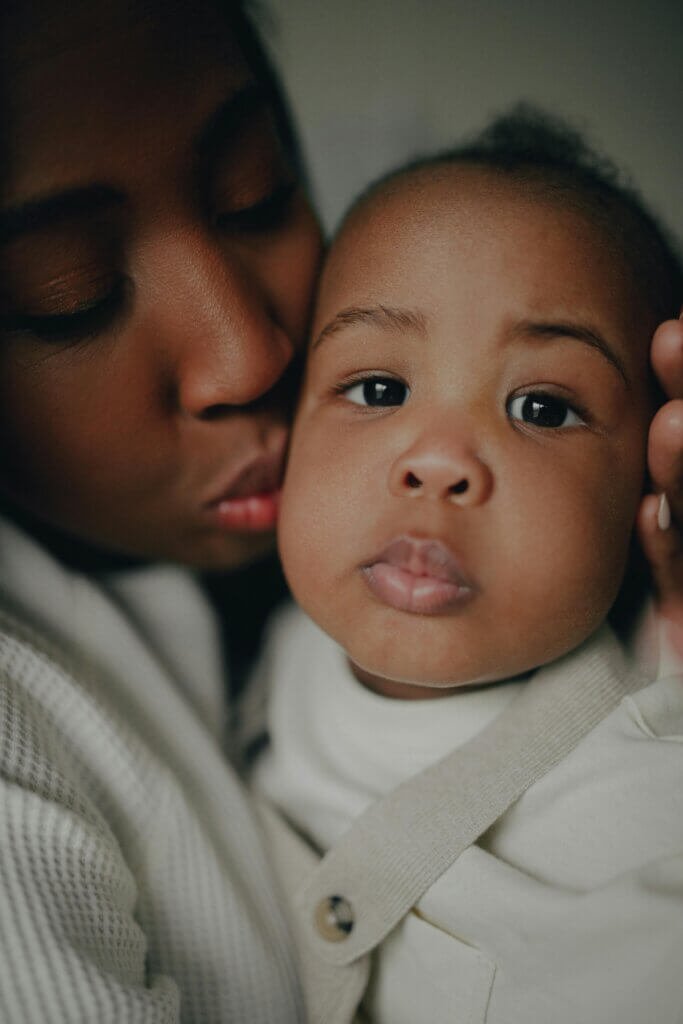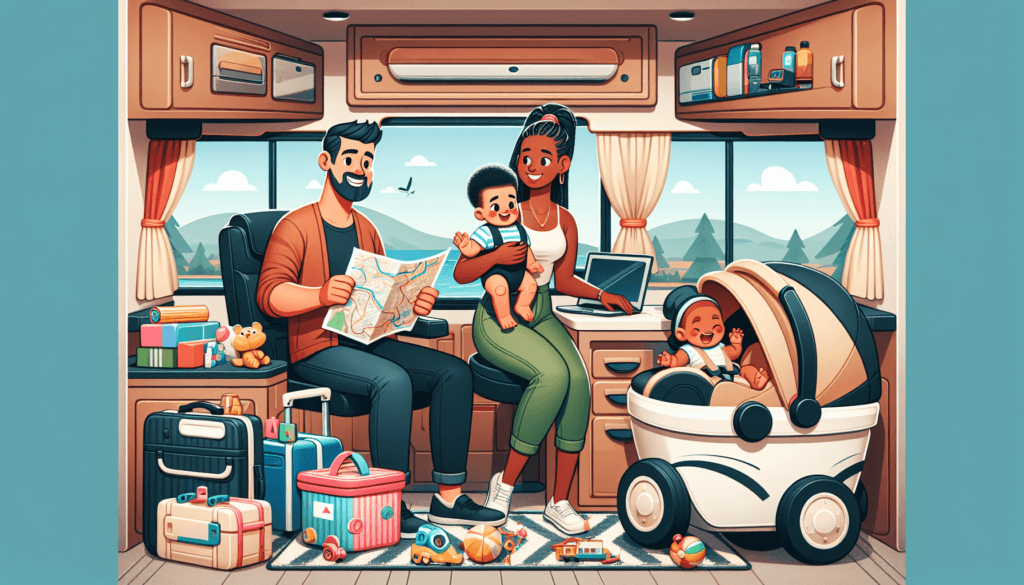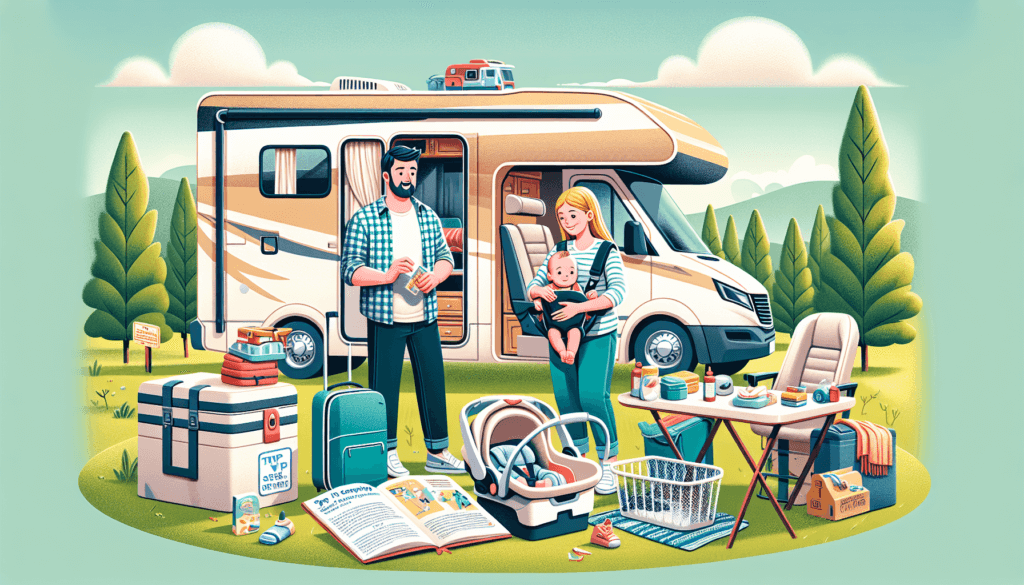Are you a parent who loves camping but worries about bringing your baby along? Look no further! In this article, we will provide you with some valuable tips on how to embark on an RV camping trip with your little one, ensuring a stress-free and enjoyable experience for the whole family. From packing essentials to creating a safe and comfortable sleeping area, we’ve got you covered. So, grab your baby gear and get ready for an unforgettable adventure in the great outdoors!

Planning and Preparation
Choosing the Right RV
When planning an RV camping trip with a baby, the first step is to ensure you choose the right RV. Consider the size and layout of the RV, as well as the amenities it offers. Look for RVs that have separate sleeping areas, a kitchenette, and a bathroom with a shower. This will provide you with the convenience and comfort you need when traveling with a baby.
Creating a Packing List
Creating a comprehensive packing list is essential when traveling with a baby in an RV. Start by including all the basic necessities, such as diapers, wipes, clothing, and toiletries. Don’t forget to pack baby-specific items such as bottles, formula or milk, pacifiers, and baby toys. Additionally, include items for safety, such as a first aid kit and baby-proofing supplies.
Organizing Baby Essentials
To ensure a stress-free RV camping trip with a baby, it’s important to organize all the baby essentials in a convenient and accessible manner. Use storage containers or bins to group similar items together, such as diapers and wipes, feeding supplies, and baby clothes. This will make it easier to find what you need when you need it during your trip.
Selecting Baby-Friendly Campgrounds
When selecting campgrounds for your RV trip with a baby, it’s important to choose ones that are baby-friendly. Look for campgrounds that offer amenities such as playgrounds, baby changing stations, and laundry facilities. Additionally, consider the location of the campground, making sure it is in a safe and family-friendly environment.
Safety Precautions
Baby-Proofing the RV
Baby-proofing your RV is crucial to ensure the safety of your baby during your camping trip. Look for potential hazards, such as sharp corners, open cabinets, and electrical outlets, and take necessary measures to minimize the risks. Use corner guards and cabinet locks to prevent accidents, and cover electrical outlets with safety plugs.
Securing Car Seats and Cribs
Properly securing car seats and cribs is of utmost importance when traveling with a baby in an RV. Make sure the car seat is installed correctly and is compatible with your RV’s seat belts. When setting up the crib, ensure it is stable and secure to prevent any accidental falls.
Preventing Heat and Cold Exposure
When camping with a baby, it’s important to protect them from extreme temperatures. During hot weather, keep your RV cool by using shade, fans, or air conditioning. Be cautious not to expose your baby to direct sunlight for extended periods, and always dress them in lightweight and breathable clothing. In cold weather, insulate your RV properly and keep your baby warm with layers of clothing, blankets, and a safe heating source.
Protecting Against Bugs and Wildlife
To protect your baby from bugs and wildlife, take necessary precautions. Use bug repellents, mosquito netting, and screens to keep insects outside your RV. Avoid leaving food or trash outside the RV, as it can attract unwanted wildlife. Be aware of your surroundings and research the local wildlife to ensure you are prepared for any potential encounters.
Sleeping Arrangements
Setting up a Cozy Crib
Creating a cozy crib for your baby is essential to ensure they get a comfortable and restful sleep during your RV camping trip. Use a portable crib or playpen with a firm mattress and fitted sheets. Create a peaceful sleeping environment by minimizing noise and light inside the RV and using blackout curtains or shades.
Choosing a Safe Sleeping Spot
Selecting a safe sleeping spot for your baby is crucial for their safety during your RV trip. Consider placing the crib or playpen in an area where they won’t be at risk of falling or getting injured. Avoid placing the crib near exit points or areas with heavy foot traffic. Make sure the sleeping area is well-ventilated to ensure your baby gets fresh air throughout the night.
Maintaining a Consistent Sleep Schedule
To help your baby adjust to the new sleeping environment during an RV trip, it’s important to maintain a consistent sleep schedule. Try to keep nap and bedtime routines similar to what your baby is used to at home. This will help them feel secure and ensure they get enough rest during the trip.
Feeding on the Road
Packing Adequate Baby Formula or Milk
When traveling with a baby in an RV, it’s important to pack an adequate supply of baby formula or milk. Consider the duration of your trip and pack enough formula or milk to last the entire duration. If you are breastfeeding, make sure to bring a breast pump and storage bags to store breast milk.
Bringing Baby-Friendly Utensils
Pack baby-friendly utensils, such as spoons, bowls, and sippy cups, to make feeding your baby easier during the trip. Opt for utensils that are lightweight, easy to clean, and safe for your baby to use. Avoid utensils with small parts that can pose a choking hazard.
Preparing Meals and Snacks
Preparing meals and snacks for your baby during an RV trip requires some planning and organization. Pack a variety of baby food options that are easy to prepare and do not require refrigeration. Opt for finger foods and healthy snacks that can be easily transported and stored. Don’t forget to pack plenty of water and formula or milk to keep your baby hydrated.
Dealing with Food Allergies
If your baby has any food allergies, it’s important to take extra precautions when planning meals during your RV camping trip. Read food labels carefully and avoid any ingredients that may trigger an allergic reaction. If necessary, consult with your pediatrician or a registered dietitian for guidance on safe food choices for your baby.

Keeping Baby Comfortable
Managing Temperature Control
Maintaining a comfortable temperature inside the RV is crucial for your baby’s comfort. Use air conditioning or fans to regulate the temperature during hot weather, and portable heaters or insulation during cold weather. Monitor the temperature regularly and make adjustments as needed to ensure your baby is neither too hot nor too cold.
Providing Shade and Sun Protection
When spending time outdoors with your baby, it’s important to provide shade and sun protection. Use umbrellas, canopies, or awnings to create shaded areas and protect your baby from direct sunlight. Dress your baby in lightweight and breathable clothing that covers their arms and legs, and use a baby-safe sunscreen on exposed skin.
Dressing Babies Appropriately
Dressing your baby appropriately for the weather conditions is essential for their comfort and well-being during the RV camping trip. During hot weather, dress them in lightweight and breathable clothing, and opt for layers in case the temperature drops. In cold weather, dress them in warm layers, including hats, mittens, and booties, to keep them cozy and protected.
Maintaining Hygiene
Maintaining good hygiene practices is important when traveling with a baby in an RV. Set up a designated diaper-changing station with all the necessary supplies, including diapers, wipes, and hand sanitizer. Regularly clean and sanitize surfaces, toys, and any items that come into contact with your baby to prevent the spread of germs.
Entertainment and Activities
Pack Age-Appropriate Toys and Books
To keep your baby entertained during the RV camping trip, pack age-appropriate toys and books. Consider toys that are easy to transport and do not take up too much space in the RV. Interactive toys, soft toys, and books with vibrant colors and textures are great options to keep your baby engaged and stimulated.
Engaging in Outdoor Exploration
Spending time outdoors and engaging in outdoor activities is a great way to bond with your baby during an RV camping trip. Take your baby for walks or hikes in nature, visit local parks or playgrounds, and explore the surroundings together. This will not only provide stimulation for your baby but also allow them to experience the beauty of nature.
Creating Safe Play Areas
Creating safe play areas inside and outside the RV is essential for your baby’s safety and enjoyment. Inside the RV, designate an area where your baby can play safely, away from any potential hazards. Outside the RV, use portable playpens, baby gates, or outdoor mats to create a secure play space for your baby.
Scheduling Breaks and Naps
It’s important to schedule regular breaks and naps for your baby during an RV camping trip. Plan for frequent stops to allow your baby to stretch, play, and have diaper changes. Stick to your baby’s normal nap schedule as much as possible to ensure they get enough rest during the trip.

Dealing with Diapering
Bringing Plenty of Diapers and Wipes
When traveling with a baby in an RV, it’s important to pack plenty of diapers and wipes. Consider the duration of your trip and the frequency of diaper changes your baby requires. Make sure to pack enough diapers and wipes to last the entire duration of the trip, with some extra as a backup.
Setting Up a Baby Changing Station
Setting up a designated baby changing station inside the RV will make diaper changes more convenient and hygienic. Use a changing pad or a towel to create a clean and comfortable surface for your baby. Keep all the necessary supplies, such as diapers, wipes, and diaper rash cream, within reach for easy access.
Proper Disposal of Diapers
Proper disposal of diapers is crucial to maintain cleanliness and hygiene during your RV camping trip. Dispose of dirty diapers in a sealed bag or a diaper disposal system to minimize odors and maintain cleanliness inside the RV. Make sure to have designated garbage bins for diapers and dispose of them appropriately at designated disposal areas.
Handling Emergencies
Knowing the Location of the Nearest Hospital
Before embarking on your RV camping trip, research and make note of the nearest hospitals or medical facilities along your route. This will ensure that you are prepared in case of any medical emergencies that may arise with your baby. Keep the contact information and directions to the nearest hospital easily accessible.
Carrying a First Aid Kit
Always carry a well-stocked first aid kit when traveling with a baby in an RV. Include items such as bandages, antiseptic ointment, thermometer, pain relievers, and any necessary medications prescribed for your baby. Familiarize yourself with the contents of the first aid kit and learn basic first aid procedures, such as treating minor injuries or fevers.
Being Aware of Common Baby Ailments
Being aware of common baby ailments and their symptoms is important when traveling with a baby in an RV. This will enable you to identify any potential health issues and take appropriate actions. Familiarize yourself with common baby ailments such as colds, fevers, rashes, and digestive issues, and consult a pediatrician if any concerns arise.
Knowing Emergency Contact Information
Ensure that you have all necessary emergency contact information readily available during your RV camping trip. This includes the contact numbers of your pediatrician, emergency medical services, and any other relevant emergency contacts. Also, keep a list of any medical conditions or allergies your baby may have to inform medical professionals if necessary.

Managing Travel Time
Planning Frequent Stops
When traveling with a baby in an RV, it’s important to plan for frequent stops to allow for feeding, diaper changes, and stretching. This will not only ensure your baby’s comfort but also give you a chance to rest and rejuvenate during the trip. Research rest areas or family-friendly stops along your route to incorporate into your itinerary.
Keeping Babies Engaged During Travel
Keeping your baby engaged during travel is essential to prevent fussiness and boredom. Use a variety of toys, books, and music to keep your baby entertained during the journey. Sing songs, play games, and interact with your baby to create a positive and enjoyable travel experience.
Optimizing Nap and Sleep Schedules
To make the most of your RV trip, optimize your baby’s nap and sleep schedules according to your travel plans. Plan your driving schedule around your baby’s sleep times to ensure they have a comfortable and uninterrupted rest. Stick to your baby’s regular sleep routine as much as possible to maintain consistency during the trip.
Ensuring Comfortable Seating
Ensuring comfortable seating for you and your baby is important during an RV camping trip. Make sure the baby’s car seat is properly installed and secured for their safety during travel. For yourself, use seat cushions or ergonomic supports to alleviate discomfort during long drives and ensure proper posture.
Seeking Help and Support
Traveling with Other Parents
Traveling with other parents who have experience with RV camping and babies can be a great source of support and companionship. Consider traveling with friends or family members who have a similar RV setup and are also traveling with young children. This will provide you with opportunities to share tips, help each other out, and create lasting memories together.
Finding Family-Friendly Campgrounds
When planning your RV trip, seek out family-friendly campgrounds that cater to the needs of parents traveling with babies. Research campgrounds that offer amenities such as playgrounds, baby-changing stations, laundry facilities, and family-friendly activities. This will ensure a welcoming and supportive environment for you and your baby.
Utilizing Online Resources for Tips
There are plenty of online resources available that provide valuable tips and advice for RV camping with a baby. Explore parenting websites, forums, and blogs that specialize in family travel and RV camping to gather helpful information and insights. You can also find checklists, packing guides, and firsthand experiences from other parents who have embarked on similar adventures.
Joining RV Camping With Baby Communities
Joining RV camping with baby communities is a great way to connect with other parents who have gone through or are going through similar experiences. Look for online groups or social media communities where parents share their experiences, offer support, and provide valuable advice. Participating in such communities can help you find inspiration, gain new perspectives, and make meaningful connections with like-minded parents.
In conclusion, RV camping with a baby can be a rewarding and memorable experience if planned properly. By choosing the right RV, organizing baby essentials, taking safety precautions, and ensuring your baby’s comfort, you can create a stress-free and enjoyable trip for the whole family. Remember to seek help and support, utilize online resources, and connect with other parents who have ventured on similar journeys. Happy RV camping with your little one!



